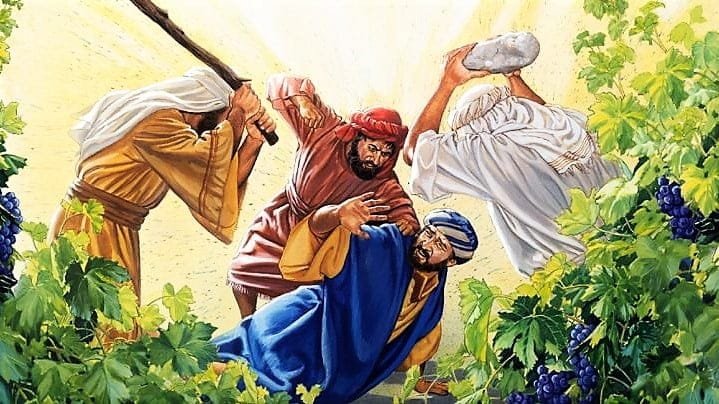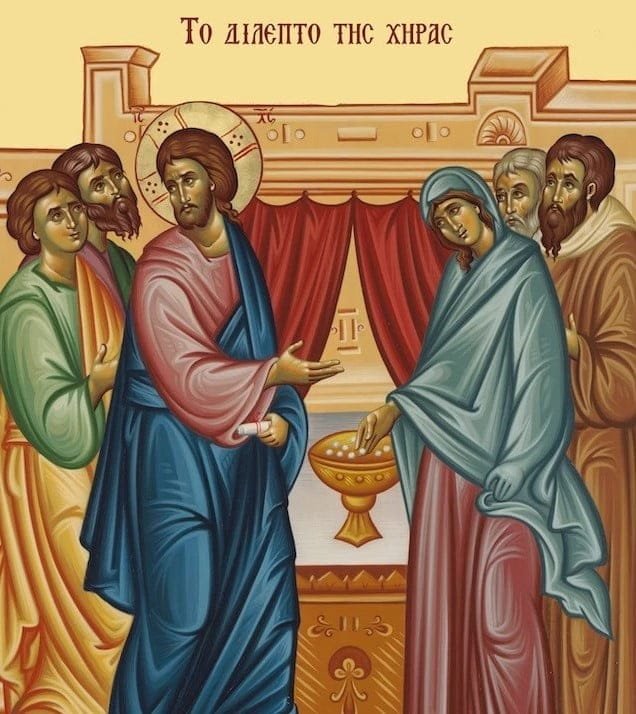DAILY GOSPEL COMMENTARY: THE PARABLE OF THE WICKED TENANTS (Mk 12:1-12)

Monday, 10th week of Ordinary Time
GOSPEL
Mk 12:1-12
Jesus began to speak to the chief priests, the scribes, and the elders in parables. “A man planted a vineyard, put a hedge around it, dug a wine press, and built a tower. Then he leased it to tenant farmers and left on a journey. At the proper time he sent a servant to the tenants to obtain from them some of the produce of the vineyard. But they seized him, beat him, and sent him away empty-handed. Again he sent them another servant. And that one they beat over the head and treated shamefully. He sent yet another whom they killed. So, too, many others; some they beat, others they killed. He had one other to send, a beloved son. He sent him to them last of all, thinking, ‘They will respect my son.’ But those tenants said to one another, ‘This is the heir. Come, let us kill him, and the inheritance will be ours.’ So they seized him and killed him, and threw him out of the vineyard. What then will the owner of the vineyard do? He will come, put the tenants to death, and give the vineyard to others. Have you not read this Scripture passage: The stone that the builders rejected has become the cornerstone; by the Lord has this been done, and it is wonderful in our eyes?”
They were seeking to arrest him, but they feared the crowd, for they realized that he had addressed the parable to them. So they left him and went away.
GOSPEL COMMENTARY FROM THE NAVARRE BIBLE, GOSPEL OF ST. MARK (WITH PERMISSION)
This parable is a masterly summary of the history of salvation. To explain the mystery of his redemptive Death, Jesus makes use of one of the most beautiful allegories of the Old Testament: the so-called “song of the vineyard,” in which Isaiah (5:1-7) prophesied Israel’s ingratitude for God’s favours.
- On the basis of this Isaiah text, Jesus reveals the patience of God, who sends one messenger after another — the prophets of the Old Testament — until at last, as the text says, he sends “his beloved son”, Jesus, whom the tenants will kill.
- This expression, as also that which God himself uses to describe Christ at Baptism (1:11) and the Transfiguration (9:7), points to the divinity of Jesus, who is the cornerstone of salvation, rejected by the builders in their selfishness and pride.
- To the Jews listening to Jesus telling this parable, his meaning must have been crystal clear. The rulers “perceived that he had told the parable against them” (v.12) and that it was about the fulfilment of the Isaiah prophecy.
GOSPEL COMMENTARY FROM POPE FRANCIS
Dear brothers and sisters, good day!
In today’s Gospel passage (see Mt 21:33-43) Jesus, foreseeing His passion and death, tells the parable of the murderous vintners, to admonish the chief priests and elders of the people who are about to take the wrong path. Indeed, they have bad intentions towards Him and are seeking a way of eliminating Him.
The allegorical story describes a landowner who, after having taken great care of his vineyard (see v. 33), had to depart and leave it in the hands of farmers. Then, at harvest time, he sends some servants to collect the fruit; but the tenants welcome the servants with a beating and some even kill them. The householder sends other servants, more numerous, but they receive the same treatment (see vv. 34-36). The peak is reached when the landowner decides to send his son: the winegrowers have no respect for him, on the contrary, they think that by eliminating him they can take over the vineyard, and so they kill him too (cf. vv. 37-39).
The image of the vineyard is clear: it represents the people that the Lord has chosen and formed with such care; the servants sent by the landowner are the prophets, sent by God, while the son represents Jesus. And just as the prophets were rejected, so too Christ was rejected and killed.
At the end of the story, Jesus asks the leaders of the people: “When the owner of the vineyard comes, what will he do to those tenants?” (v. 40). And, caught up in the logic of the narrative, they deliver their own sentence: the householder, they say, will severely punish those wicked people and entrust the vineyard “to other tenants who will deliver the produce to him at the proper time” (v. 41).
With this very harsh parable, Jesus confronts his interlocutors with their responsibility, and He does so with extreme clarity. But let us not think that this admonition applies only to those who rejected Jesus at that time. It applies to all times, including our own. Even today God awaits the fruits of His vineyard from those He has sent to work in it. All of us.
In any age, those who have authority, any authority, also in the Church, in God’s people, may be tempted to work in their own interests instead of those of God. And Jesus says that true authority is when carried out service; it is in serving, not exploiting others. The vineyard is the Lord’s, not ours. Authority is a service, and as such should be exercised, for the good of all and for the dissemination of the Gospel. It is awful to see when people who have authority in the Church seek their own interests.
SOURCE: http://w2.vatican.va/content/francesco/en/angelus/2020/documents/papa-francesco_angelus_20201004.html
EMPHASIS MINE.
Stay updated: subscribe by email for free TO OUR NEW WEBSITE catholicsstrivingforholiness.org (PUT YOUR EMAIL IN THE SUBSCRIBE WIDGET).
If you need some resources regarding a particular topic, feel free to use the search WIDGET which has access to thousands of posts, categories and tags on Catholic spirituality.
Cordially inviting you as well to follow www.fb.com/Catholicsstrivingforholiness. and share our posts to help more people in their Christian faith and life.
Thanks and God bless you and your loved ones! Fr. Rolly Arjonillo.


